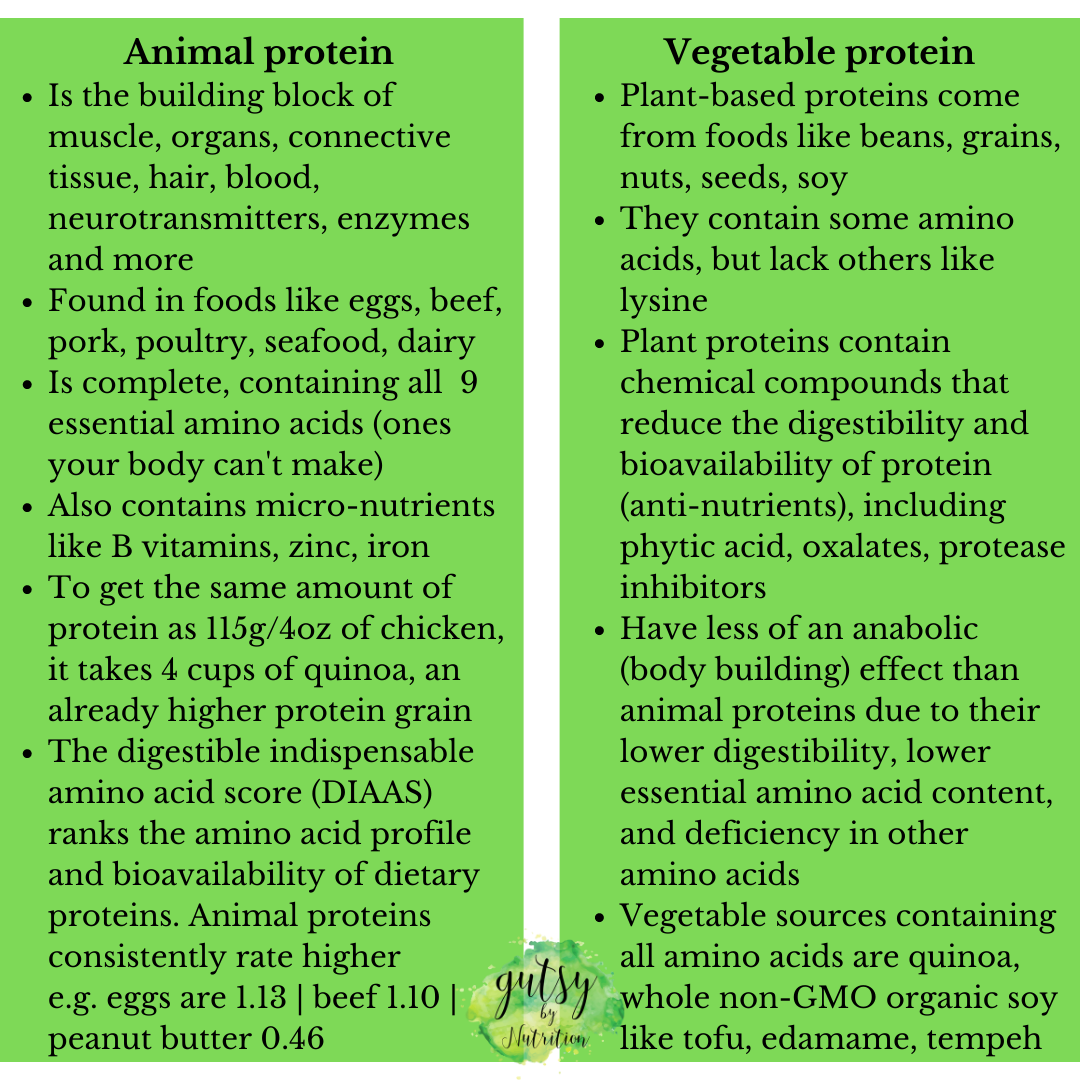What protein should you eat?
There is a lot of information, misinformation and opinion about what protein is good for you. Below are some research-based facts.
About protein
Protein is the building block of our muscle, organs, connective tissue, hair, blood, neurotransmitters, enzymes and more. Animal sources include eggs, beef, pork, poultry, seafood, dairy, while plant-based sources are beans, grains, nuts, seeds and soy.
We evolved to eat a variety of whole foods to get the nutrients our cells need to function. Yet humans mostly get our protein from cereals (yes, we eat more of these than all animal sources combined!).
Animal and plant-based protein
Here are some differences between these two types of protein.
Animal protein...
Is complete, containing all 9 essential amino acids (ones your body can't make)
It also contains micro-nutrients like B vitamins, zinc, iron
To get the same amount of protein as 115g / 4oz of chicken breast you would have to eat 4 cups of quinoa, an already higher protein grain (that's a lot!)
The Digestible Indispensable Amino Acid Score (DIAAS) ranks the amino acid profile and bioavailability of dietary proteins. Animal proteins consistently rate higher e.g. eggs are 1.13; beef is 1.10; and peanut butter is 0.46
Plant-based protein…
Provides some amino acids, but lack others like lysine
Contains chemical compounds that reduce the digestibility and bioavailability of protein (anti-nutrients), including phytic acid, oxalates and protease inhibitors
Has less of an anabolic (body building) effect than animal proteins due to its lower digestibility, lower essential amino acid content, and deficiency of other amino acids
A few vegetable sources contain ALL amino acids i.e. quinoa, and whole non-GMO organic soy like tofu, edamame, tempeh
Unfortunately, food labels don't give us an amino acid breakdown or digestibility score. This would allow us to make the best choices so we eat a balanced diet with optimal amounts of the 3 macronutrient groups we must obtain from food – protein, fat and carbs (fibre).
I'm not against vegetarianism and have vegetarian and pescatarian clients as well as meat-eating ones, but eating this way takes more effort to ensure you get sufficient protein for your needs. If someone doesn’t eat certain proteins because they can’t digest them properly, this means they may lack stomach acid or digestive enzymes, or are experiencing other gut imbalances that may need to be resolves.
Whichever way you get your protein, there are poor and good sources of both animal protein and plant-based proteins that don't involve the clearing of land, the use of harmful chemicals and antibiotics, and the mistreatment of animals, or animals living on agricultural land.
Interestingly, foods grown or raised in this way also have greater nutrient value, meaning we need to eat less of them.
Recommended protein levelS
Australian Government recommended levels are listed below. I recommend more sometimes, but this is indivual e.g. for weight retention and weight loss, eating more can help. Recommendations for pregnant and breastfeeding women, infants and children vary again. It’s important to note that our protein needs go up as we age.
Men
19-30 yrs - 64 g/day (0.84 g/kg)
31-50 yrs - 64 g/day (0.84 g/kg)
51-70 yrs - 64 g/day (0.84 g/kg)
>70 yr65 g/day 81g/day (1.07 g/kg)
Women
19-30 yrs 46 g/day (0.75 g/kg)
31-50 yrs 37 46 g/day (0.75 g/kg)
51-70 yrs 46 g/day (0.75 g/kg)
>70 yrs 57 g/day (0.94 g/kg)

